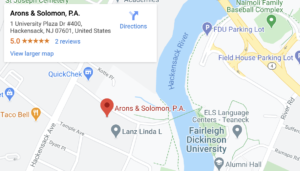Bergen County Domestic Violence Lawyer

If you are thinking of making a plan to escape your abusive partner, you are not alone. The Bergen County domestic violence lawyers at Arons & Solomon Divorce Lawyers are here to hear your story and advocate for you. We represent domestic violence survivors with compassion and skill.
Contact our Northern New Jersey law office at (201) 487-1199 to arrange a time to discuss your legal options. Your first consultation is free, and everything you say will be held in the strictest confidence. The time to act is now – call our caring team for help today.
Table of Contents
How Arons & Solomon Divorce Lawyers Can Help You If You’re a Victim of Domestic Violence in Bergen County, NJ

Spousal abuse can be smothering. Coping with a divorce from an abusive spouse can be treacherous.
Our compassionate divorce attorneys in Bergen County, NJ can support you through this process.
Collectively, our attorneys have more than 150 years of experience helping clients like you navigate these incredibly difficult issues. We appreciate how tough it can be to speak out and address domestic violence – and you can rest assured that we’ll be there to support you every step of the way.
Among other things, we will:
- Help you understand the legal options available to you, including filing for divorce and seeking sole custody of your kids
- File a petition to secure a restraining order to prevent your spouse from contacting you
- Handle all conversations with your spouse and/or their legal counsel
Our divorce and family law firm in Bergen County, NJ handles all family law cases. We handle child custody, child support, spousal support, and property division.
We support our clients through every step of the process. We explain what a client can expect. We welcome questions and we want to help our clients understand their case.
Overview of Domestic Violence Cases

According to the National Coalition Against Domestic Violence, domestic violence is common.
On average, 1 in 3 women and 1 in 4 men experience physical violence at the hands of an intimate partner.
In our culture, it can be hard to understand why people stay in abusive relationships. It should be easy for others to leave abusive situations, right? It’s not always as easy as it seems.
Some barriers to escaping a violent relationship include:
- Fear of raising a child alone or without financial support
- Friends and family who are unsupportive or dismissive
- The belief that the abuse is the fault of the abused
Domestic violence survivors fear that police will not accept reports of abuse.
They also fear that reporting abuse will only make it worse. They fear the abuser’s deadly violence after an unsuccessful attempt to leave. It can often seem safer for a domestic violence victim to not call the police.
A person may feel like they have no place to go or will be homeless if they leave their abuser. Once the decision to leave is made, it often takes time to prepare for a safe escape.
After leaving an abusive situation, a domestic violence survivor can seek legal remedies. Often, domestic violence cases begin with a request for a temporary restraining order. If granted, a temporary restraining order can be later converted to a permanent order.
How New Jersey Law Defines Domestic Violence
Domestic violence is a pattern of abusive behavior. It can include threats, intimidation, or isolation.
Certain crimes, when committed by one partner against another, count as domestic violence. In New Jersey, these domestic violence crimes include:
- Stalking
- Harassment
- Sexual assault
- False imprisonment or criminal restraint
Still, many people have difficulty recognizing partner abuse. Stalking is one form of abuse that can be difficult to identify. If a partner shows up at work or school, outsiders may see a devoted lover.
For a person experiencing abuse, a partner’s presence feels more like a threat.
Harassment can include repeated unwanted communications. When a partner calls, then texts, then emails, then calls again – that can be harassment.
Talking to a lawyer can seem impossible when a person is experiencing domestic abuse. At Arons & Solomon Divorce Lawyers, we have experience with clients overwhelmed by abusive situations. We can help you make the best plant to safely break free.
Recognizing Domestic Violence
Generally, abusive behavior escalates over time. This means it starts small. When talking about domestic violence, small means non-physical.
Common non-physical abusive behaviors include aggressions like humiliation or embarrassment. Other examples of non-physical abuse include:
- Controlling how a partner dresses or wears their hair
- Using put-downs to shame or embarrass a partner
- Telling a partner they are a bad parent or lover
People often struggle to call these behaviors abuse.
A partner’s behavior shows warning signs of domestic violence or abuse if they:
- Demean their partner, whether publicly or in private
- Accuse their partner of cheating or having an affair
- Have a “bad temper” or verbally abuse their partner
Abusers often exhibit extreme jealousy and possessiveness over their partner.
When a person is suffering from domestic violence, their abuser may alienate them. Abusers often sabotage their partner’s relationships. An abusive partner may discourage family relationships, work relationships, or school friends.
It can be hard to talk about domestic violence. Survivors fear having their concerns dismissed. At least one study has shown that most abusers do not have criminal records. It can be hard to tell about your experience when your abuser charms others.
Until one day, it gets physical for the first time. In a rage, a partner throws a punch or a kick, and the abused person is in shock. It can take years of physical abuse before a person gets the courage to leave.
Protective Orders in Bergen County Domestic Violence Cases
Safety is a critical issue to address in domestic violence cases. Many survivors escape with the aid of a safety plan.
We offer our clients practical advice to safeguard privacy. If you are not yet ready to leave your abuser, we understand. We can help make a plan.
Getting a Protective Order in New Jersey
Once you decide to leave your abuser, we can help you get a New Jersey protective order. There are two kinds of protective orders: temporary and final.
You can get a temporary protective order if there’s an immediate risk of abuse. You can later get a final, permanent protective order.
Both kinds of protective orders have similar terms. Usually, a protective order orders the defendant:
- Not to contact the protected person, directly or indirectly
- To maintain a minimum distance between the defendant and the protected person,
- Not to go near the workplace or home of the protected person
When partners live together, the defendant must move out of the family home for the time stated in the order. This is true even if the defendant owns the home or their name is on the lease.
Temporary Restraining Order (TRO)
A temporary restraining order (TRO) is a kind of protective order. The process to get a TRO is quick and easy, for the benefit of those experiencing abuse. The TRO will expire after a brief period. Usually, the court schedules a hearing on the final restraining order on the same day that the TRO expires.
Depending on where a person requests a TRO, a judge may issue the order over the phone immediately. In other cases, there’s a domestic violence interview and a hearing before a judge issues the TRO.
A court can enter a TRO even if the accused abuser has not had a chance to respond. The accused abuser does not have to be present at the hearing for the TRO.
A court can decide on a final protective order whether or not a TRO is granted. But if a TRO is granted, it must be served on the defendant.
Final Restraining Order (FRO)
A final restraining order (FRO) has the same protective measures as a TRO, but it has an indefinite time limit.
Children and Domestic Violence
Many parents believe staying married to their abuser is better for their children. We can help you protect your children from an abusive parent. Witnessing domestic violence can negatively impact children in many ways. Children from homes where domestic violence occurs are likely to continue the cycle.
A young boy who watches his mother suffer abuse is more than 10 times more likely to become an abuser. A young girl from a home where her father abused her mother is 6 times more likely to be sexually abused as an adult.
Domestic abuse often involves power dynamics between partners. The abusive spouse exercises power through their abuse. Abusers sometimes seek to continue the same power dynamics in legal proceedings.
False Allegations of Domestic Violence
Domestic violence laws provide victims with extraordinary remedies. Unfortunately, those remedies can tempt some parents to make false accusations. We zealously defend clients facing false and unfair accusations of domestic violence.
Domestic violence victims have to process their abuse in an adversarial system. Our years of practice taught us how domestic violence causes chaos and trauma. Legal proceedings can be doubly traumatizing for domestic violence survivors.
Legal proceedings need a detailed foundation for evidence. A domestic violence survivor may have to testify about their trauma to prove their case.
Personal Injury and Domestic Violence
Under New Jersey law, an abuser can face criminal charges. And, they can be liable for losses directly related to domestic violence. You may have a personal injury claim against your abuser. Our attorneys can help you identify all of your legal options and connect you with a reputable personal injury attorney if you decide to take further action.
Domestic Violence Lawyers Available Throughout Bergen County, New Jersey
At Arons & Solomon Divorce Lawyers, our domestic violence attorneys provide legal representation to clients throughout Bergen County.
We regularly assist clients with domestic violence matters:
- Teaneck
- Englewood
- Ridgewood
- Tenafly
- Franklin Lakes
- Upper Saddle River
- Allendale
- Old Tappan
- Hohokus
- Saddle River
Please don’t hesitate to pick up the phone and give our northern New Jersey law office a call to discuss your child custody case.
Call Our Bergen County Domestic Violence Lawyers For a Free Consultation
Once you have recognized the signs of domestic violence, you already took the first step. New Jersey law protects the sufferers of domestic violence. We can help you get the protection you deserve. Contact the experienced Bergen County domestic violence lawyers at Arons & Solomon Divorce Lawyers today for help.


